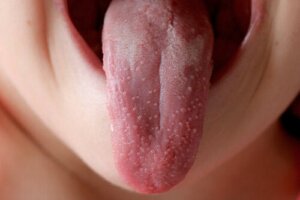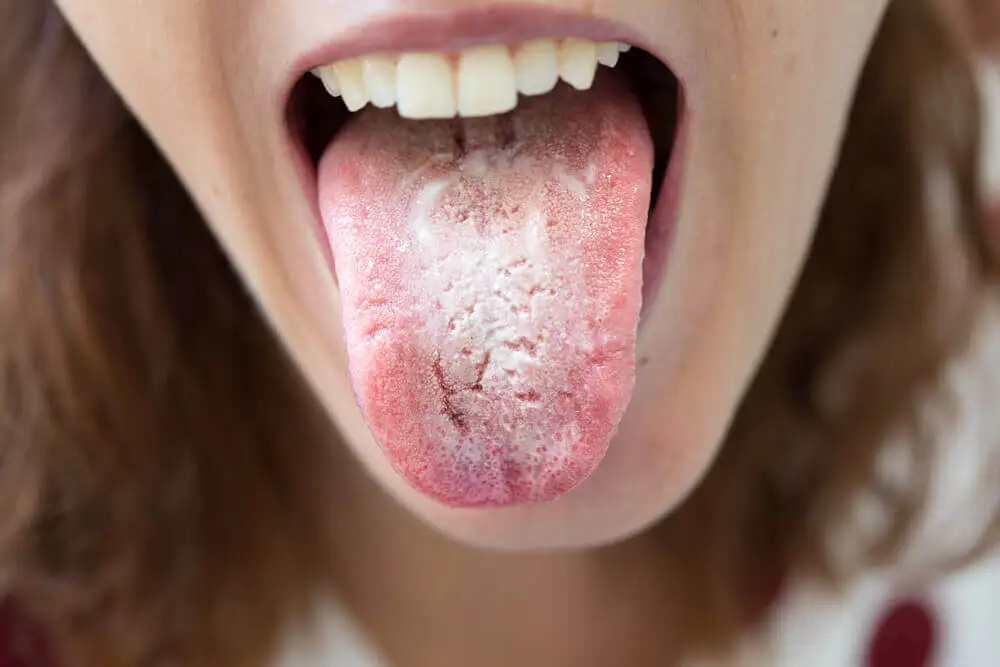Why Do We Get Swollen Taste Buds?


Reviewed and approved by the doctor Nelton Abdon Ramos Rojas
Taste buds are sensory receptors located on the tongue, which, when exposed to certain types of food, can swell up. In this article, we’ll explain why we can get swollen taste buds.
Each taste bud is made up of receptor cells that send nerve signals to the brain. Thanks to them, we are able to discriminate between sweet, salty, sour, bitter, and umami, a Japanese word that means “tasty”.
When the papillae are inflamed, they become smaller, whitish and often hurt at the slightest touch. If you don’t yet know what can cause taste buds to become irritated, read this article.
Swollen taste buds
This condition is also known as lingual papillitis and produces small reddish or whitish bumps on the surface of the tongue. Depending on the location, the affected papillae will be different, as the different types (goblet, fungiform, filiform and foliated) are distributed in a very specific way.
1. Hyperstimulation
It occurs more frequently after eating spicy or salty foods. The hyperstimulation is due to the fact that the substances found in these types of foods act as irritants to the taste buds. Ingesting some cold liquid or ice cream could help counteract the inflammation.
Find out more: Do You Wake Up With a Bitter Taste in Your Mouth?
2. Toxins on the tongue
Frequent exposure of the tongue to toxins such as alcohol or tobacco smoke causes irritation and inflammation of the papillae. Toxins cause the cells that make up these structures to retain both fat and fluids.
Also, the residue of these toxins are left on the tongue. This whitish coating is usually seen in the morning. It’s simply the body’s way of rejecting them. To prevent it, you simply need to abstain from alcohol and cigarettes.
3. Stress

As we well know, stress can negatively affect many of the body’s functions. Taste buds are no exception.
Emotional stress often leads to hormonal disorders. In turn, these problems end up affecting the body in various ways. One of them is small ulcers in the mouth (aphthous ulcers). Another possible consequence is inflammation of the taste buds due to a dysfunction of the immune system.
This could cause the tongue and other parts of the body to absorb a large amount of bacteria. All this could either cause swollen taste buds or make them take much longer to disappear.
In addition to practicing relaxation techniques, it would be advisable to consult a psychologist.
4. Trauma
Trauma to the tongue is usually due to accidental bites or injuries during dental procedures. As a result, the papillae tend to swell immediately. In these conditions, they tend to hurt for a long time.
This type of trauma alters the tongue tissue. As we know, this organ is a collection of muscles, and can be injured just like any other muscle.
In cases of swollen taste buds, it would be advisable to apply glycerin to the affected area. If the injury is serious or the pain persists, you should see a doctor immediately. The specialist will determine the course of action to follow.
5. Oral candidiasis

Oral candidiasis, as well as other fungal infections of the tongue, are other common causes of taste bud inflammation. In these cases, a doctor should be consulted as soon as possible. He or she will decide whether or not to treat this infection.
Find out more: How to Clean the Tongue
6. Burns
Tongue burns are a frequent type of accident. For example, they occur when we drink a cup of very hot coffee or when we eat very hot food.
More serious burns can damage the taste buds and, by extension, alter their function. They usually take longer to heal than we think, so it’s crucial to follow the doctor’s instructions and be careful at home.
When this happens to you, make sure you drink some cold liquid. This simple act will lessen the sensation of pain and prevent the burn from spreading. The low temperature of the ingested liquid will help the nerve fibers of the papillae to recover sooner. In this way, you’ll still be able to enjoy the taste of all the food you fancy eating.
7. Immunosuppression
Any immunosuppression condition makes infectious and inflammatory processes more frequent, including skin tags on your tongue. For example, this is the case with HIV/AIDS patients, those with uncontrolled diabetes mellitus, the elderly or very young children, transplant recipients, and people who chronically consume steroids for any reason.
In short, inflammation of the taste buds is a frequent and uncomfortable situation, but it has a solution. If we look after it well and follow these instructions then we’ll soon be able to enjoy all the flavors of food again, and ensure a healthier mouth overall.
All cited sources were thoroughly reviewed by our team to ensure their quality, reliability, currency, and validity. The bibliography of this article was considered reliable and of academic or scientific accuracy.
- Beidler, L.M. (ed.) (1971). Handbook of Sensory Physiology, IV. Chemical Senses 2: Taste. New York: Springer.
- Mann, M.D. (2013). “Gustatory and Olfactory Senses” (Chap. 10), in The Nervous System In Action. London: Oxford UP, pp. 101-111.
- Yamaguchi, S. (1998). “Propiedades básicas de umami y sus efectos en el sabor de los alimentos”, Críticas internacionales de alimentos 14 (2&3): 139-176.
- Brigham and Woman´s Health. Candidiasis oral. Disponible en: https://www.brighamandwomens.org/assets/BWH/surgery/oral-medicine-and-dentistry/pdfs/candidiasis-oral-spanish-bwh.pdf.
This text is provided for informational purposes only and does not replace consultation with a professional. If in doubt, consult your specialist.








